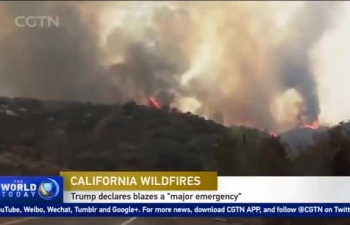WASHINGTON, Aug. 6 (Xinhua) -- Despite global outcry, the White House on Monday vowed to re-impose and fully enforce sanctions on Iran lifted under the Iran nuclear deal.
The first batch of sanctions, which will take effect at 12:01 a.m. Tuesday (0401 GMT), target Tehran's purchase of U.S. banknotes, trade in gold and other precious metals, as well as the use of graphite, aluminum, steel, coal, and software used in industrial processes.
They will also affect transactions related to the Iranian Rial, the issuance of sovereign debts, and the country's automotive sector.
Another round of sanctions, to be reinstalled on Nov. 5, will be on Iran's port, energy, shipping and shipbuilding sectors, its petroleum-related transactions, and business deals by foreign financial institutions with the Central Bank of Iran.
The Trump administration will also relist hundreds of individuals, entities, vessels, and aircraft that were previously included on sanctions lists.
Washington said it would re-impose tough sanctions on the Iranian government when it declared to leave the Iran nuke deal in May. It also laid out two wind-down periods of 90 days and 180 days for business activities in or involving Iran.
The latest sanctions were re-imposed after Monday, the final day of the 90-day wind-down period.
Accusing Tehran of having "exploited the global financial system to fund its malign activities," the White House said "the Trump Administration intends to fully enforce the sanctions reimposed against Iran, and those who fail to wind down activities with Iran risk severe consequences."
Also on Monday, U.S. President Donald Trump signed an executive order to implement these sanctions.
In a statement, he urged all nations to "reduce or end imports of Iranian crude oil" to join in the U.S.-led "maximum economic pressure" campaign on Tehran to force it to change behaviors.
He also attacked the Iran nuke deal, saying it was "horrible, one-sided" and had failed to protect U.S. national security.
However, Trump said, "I remain open to reaching a more comprehensive deal" that addresses the full range of Iran's activities, including its ballistic missile program and its accused "support for terrorism."
"The United States welcomes the partnership of likeminded nations in these efforts," he said.
Before the White House statement, an anonymous senior administration official told the media via teleconference that Washington is "working to build a global coalition to counter Iran's malign activity."
However, "our stated policy has not been regime change, it has been to modify the Iranian regime's behavior," he said.
Reiterating the U.S. commitment to pushing all nations' import of Iranian oil to zero, the official said Washington is not "looking to grant exemptions or waivers."
"But we do and are glad to discuss requests and look at requests on a case-by-case basis," he said.
When asked to explain Trump's earlier offer to meet with the Iranian leadership at any time with no preconditions, the official said Trump was saying he was not going to give up anything in advance of the meeting, and there were no preconditions.
Earlier on Monday, the European Union (EU), Britain, France and Germany said in a joint statement they would maintain economic ties with Tehran, and "are determined to protect European economic operators engaged in legitimate business with Iran."
Saying the Joint Comprehensive Plan of Action (JCPOA) is working and delivering on its goal, the statement noted that the deal "is a key element of the global nuclear non-proliferation architecture, crucial for the security of Europe, the region and the entire world."
"This is why the European Union's updated Blocking Statute enters into force on Aug. 7 to protect EU companies doing legitimate business with Iran from the impact of U.S. extra-territorial sanctions," it said. "Preserving the nuclear deal with Iran is a matter of respecting international agreements and a matter of international security."
The statute, introduced in 1996 in response to U.S. extra-territorial sanctions legislation, was amended on June 6 by adding within its scope the list of extra-territorial U.S. sanctions on Iran. It forbids EU residents and companies from complying with the listed U.S. extra-territorial sanctions legislation unless they are exceptionally authorized to do so by the European Commission.
The statute also allows EU companies to "recover damages arising from such legislation from the persons or entities causing them, and nullifies the effect in the EU of any foreign court rulings based on it."
Earlier, Turkey and India, both long-term business partners of Iran, also voiced their opposition against U.S. unilateral sanctions.
U.S.-Iranian relations have been at odds as the Trump administration left the historic Iran nuclear deal, delegitimized its government, vowed to re-impose sanctions on the nation and pressed other nations to cut down their purchase of Iranian oil to zero.
Tehran has so far shown little interest in talking with Washington over a new nuke deal. Iranian Supreme Leader Ayatollah Ali Khamenei said lately that any negotiation with the United States to solve the existing problems is an "obvious mistake."













